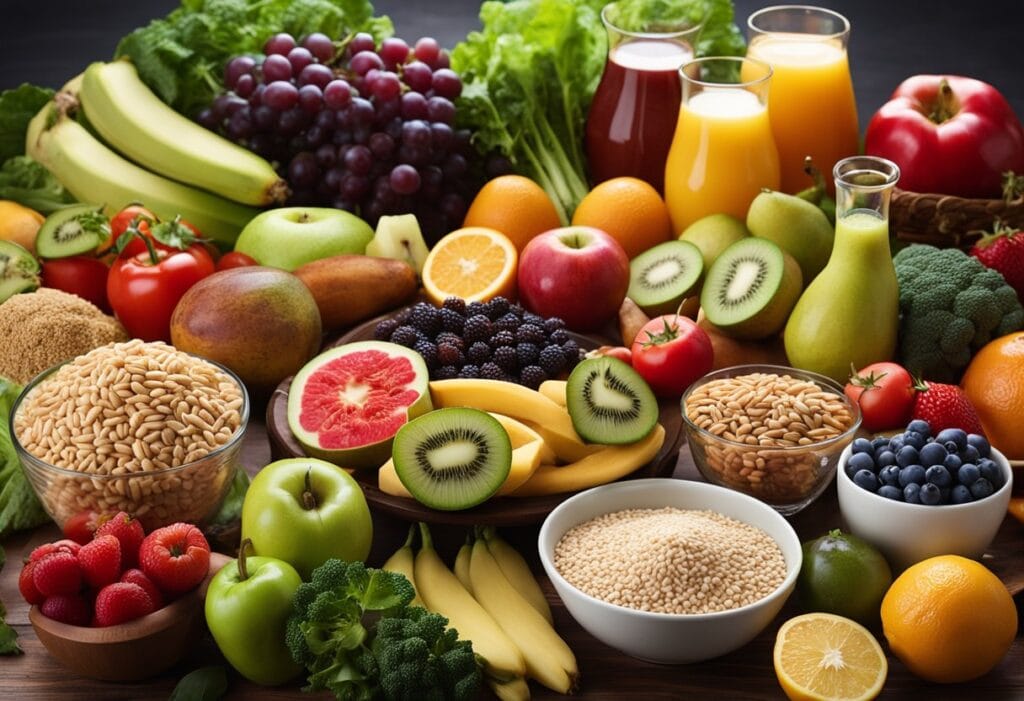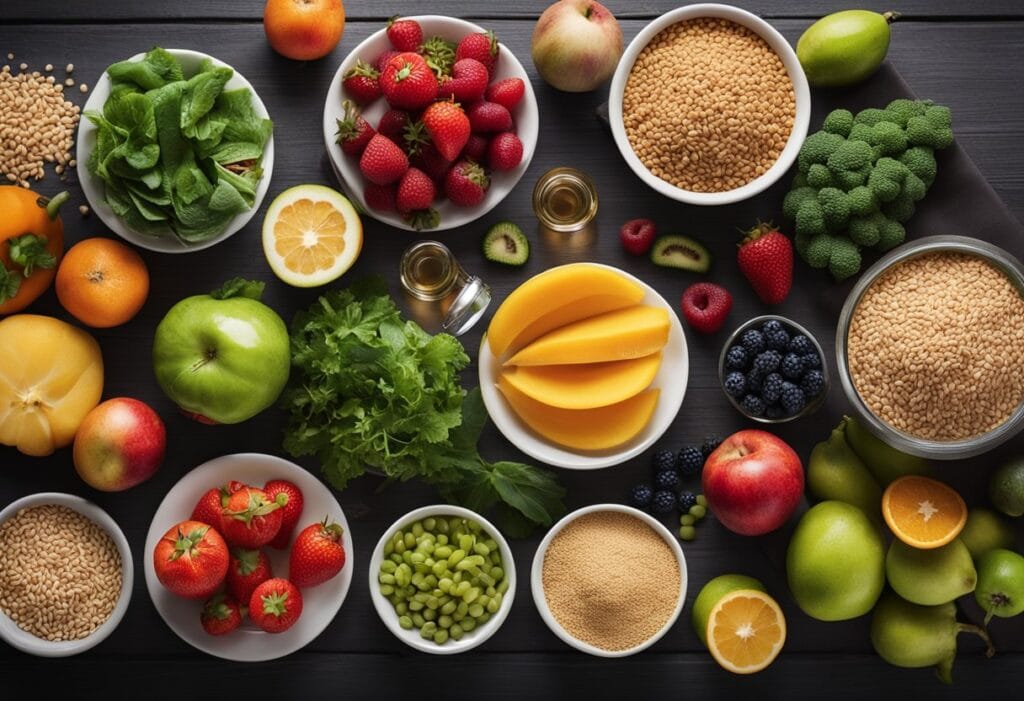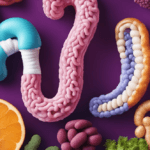Meal planning is an essential aspect of maintaining a healthy lifestyle. It not only helps you save time and money but also ensures that you are consuming a balanced diet that meets your nutritional needs. When it comes to digestive health, meal planning becomes even more crucial. Our digestive system is responsible for breaking down and absorbing nutrients from the food we eat, and it plays a critical role in maintaining our overall health and wellbeing. Therefore, it is essential to design a meal plan that supports digestive health.

Understanding digestive health is the first step towards developing a meal plan that supports it. Our digestive system is a complex network of organs that work together to break down food and absorb nutrients. The gut microbiome, which is a collection of trillions of microorganisms that live in our digestive system, plays a crucial role in maintaining digestive health. A healthy gut microbiome is associated with better digestion, improved immune function, and reduced risk of chronic diseases such as obesity, diabetes, and heart disease.
Overview
Key Takeaways
- Meal planning is crucial for maintaining digestive health.
- A healthy gut microbiome is essential for good digestive health.
- A digestive health meal plan should include a variety of nutrient-dense foods that are easy to digest.
Understanding Digestive Health

When it comes to digestive health, it’s essential to understand the role of gut bacteria and the impact of diet on digestion. The digestive system is home to trillions of microorganisms, including bacteria, viruses, and fungi. These microorganisms are collectively known as the gut microbiome or microbiota.
Role of Gut Bacteria
The gut bacteria play a critical role in maintaining digestive health. They help break down food, absorb nutrients, and eliminate waste. They also produce essential vitamins, such as vitamin K and some B vitamins, which our bodies cannot produce on their own.
Furthermore, the gut microbiome plays a crucial role in regulating the immune system. It communicates with the immune system to distinguish between harmful and beneficial microorganisms. This communication helps the immune system to function correctly and prevent infections and inflammation.
Impact of Diet on Digestion
The food we eat has a significant impact on our digestive health. A healthy diet can promote the growth of healthy gut bacteria, while an unhealthy diet can lead to an imbalance of gut bacteria, which can result in digestive problems.
A diet that is rich in fiber, whole grains, and plant-based foods is essential for maintaining a healthy gut microbiome. These foods provide the nutrients that our gut bacteria need to thrive. On the other hand, a diet that is high in sugar, processed foods, and unhealthy fats can lead to an overgrowth of harmful bacteria, which can cause inflammation and digestive problems.
In summary, understanding the role of gut bacteria and the impact of diet on digestion is crucial for maintaining digestive health. By following a healthy diet that promotes the growth of healthy gut bacteria, we can improve our overall digestive health and prevent digestive problems.
Essentials of Digestive Health Meal Planning

When it comes to maintaining digestive health, a healthy diet plays a crucial role. A well-planned meal can help you achieve optimal digestive health and prevent digestive disorders. In this section, we will discuss the essentials of a digestive health meal plan.
Macronutrients and Fiber
Macronutrients such as proteins, whole grains, and vegetables are essential for maintaining digestive health. Proteins are necessary for building and repairing tissues, and they also help in the production of digestive enzymes. Whole grains and vegetables are rich in fiber, which is beneficial for gut health. Fiber helps in regulating bowel movements and preventing constipation.
Importance of Hydration
Drinking enough water is crucial for maintaining digestive health. Water helps in the digestion and absorption of nutrients, and it also helps in regulating bowel movements. Dehydration can cause constipation and other digestive problems.
Prebiotics and Probiotics
Prebiotics and probiotics are essential for maintaining a healthy gut microbiome. Prebiotics are non-digestible fibers that promote the growth of beneficial gut bacteria. Probiotics are live microorganisms that provide health benefits when consumed in adequate amounts. Fermented foods such as kefir, kimchi, and yogurt are rich sources of probiotics.
In summary, a digestive health meal plan should include macronutrients such as proteins, whole grains, and vegetables, adequate hydration, and prebiotics and probiotics. By including these essentials in your meal plan, you can improve your digestive health and prevent digestive disorders.
Designing Your Meal Plan

When it comes to meal planning for digestive health, there are a few key factors to consider. By keeping these in mind, we can create a meal plan that will support our digestive system and overall health.
Meal Timing and Frequency
One important factor to consider is the timing and frequency of our meals. It’s generally recommended to eat three meals a day with snacks in between if needed. This can help keep our blood sugar levels stable and prevent overeating. Additionally, it’s a good idea to eat meals at consistent times each day to help regulate our digestive system.
Diversity in Food Choices
Another important factor is to include a variety of foods in our meal plan. This can help ensure we’re getting all the nutrients we need and can also help prevent boredom with our meals. Including a mix of fruits, vegetables, whole grains, lean proteins, and healthy fats is a good place to start.
Managing Food Intolerances
If you have food intolerances or sensitivities, it’s important to take those into account when designing your meal plan. For example, if you’re lactose intolerant, you may need to choose dairy-free options or include lactase supplements to help with digestion. Similarly, if you have IBS or inflammatory bowel disease, you may need to avoid certain foods that trigger symptoms.
By taking these factors into account, we can create a meal plan that supports our digestive health and overall well-being. Whether it’s planning out breakfast, lunch, and dinner or choosing healthy snacks to have on hand, a little bit of planning can go a long way in supporting our digestive system.
Shopping and Food Preparation
When it comes to Meal Planning for Digestive Health, creating a shopping list and meal prep strategies are key. By planning ahead, we can save time, reduce food waste, and ensure that we have healthy options on hand throughout the week.
Creating a Shopping List
Before heading to the grocery store, we recommend creating a shopping list to help us stay on track and avoid impulse purchases. To create a shopping list, we can start by planning out our meals for the week. This can help us determine what ingredients we need and avoid buying items that we won’t use.
We can also take advantage of seasonal produce to add variety to our meals. The USDA provides a Seasonal Produce Guide that can help us determine what fruits and vegetables are in season.
When creating our shopping list, we should also consider any dietary restrictions or preferences. For example, if we follow a gluten-free diet, we can make sure to include gluten-free grains like quinoa or brown rice on our list.
Meal Prep Strategies
Meal prep can help us save time during the week and ensure that we have healthy options on hand. To get started with meal prep, we can choose a day of the week to prepare our meals in advance. This can be a Sunday or any other day that works best for us.
We can start by cooking a batch of grains like quinoa or brown rice, roasting vegetables, and grilling or baking a protein like chicken or tofu. We can then portion out our meals into containers and store them in the fridge or freezer.
Another meal prep strategy is to prepare ingredients in advance. For example, we can chop up vegetables and store them in the fridge for easy use throughout the week. We can also cook a large batch of beans or lentils and use them in salads, soups, or stir-fries.
By creating a shopping list and utilizing meal prep strategies, we can make Meal Planning for Digestive Health a part of our healthy lifestyle.
Common Digestive Issues and Dietary Adjustments

When it comes to digestive issues, the food we eat can play a significant role in managing symptoms. Here are some dietary adjustments we can make to help manage common digestive issues.
Managing Bloating and Gas
Bloating and gas can be caused by a variety of factors, including eating too quickly, overeating, or consuming gas-producing foods. To manage these symptoms, we can try the following:
- Eat slowly and chew food thoroughly
- Avoid carbonated drinks and chewing gum
- Limit intake of gas-producing foods such as beans, cruciferous vegetables, and artificial sweeteners
- Incorporate probiotics into our diet to promote gut health
Dietary Approaches to IBS and IBD
Irritable bowel syndrome (IBS) and inflammatory bowel disease (IBD) are chronic conditions that can cause discomfort and pain. While there is no cure for these conditions, dietary adjustments can help manage symptoms. Here are some dietary approaches we can try:
- Increase fiber intake to regulate bowel movements and promote gut health
- Limit intake of high-fat foods, which can exacerbate symptoms
- Avoid trigger foods such as dairy, gluten, and spicy foods
- Incorporate anti-inflammatory foods such as fatty fish, leafy greens, and berries to help manage inflammation
Foods to Avoid with GERD and Diverticulitis
Gastroesophageal reflux disease (GERD) and diverticulitis are conditions that can cause discomfort and pain in the digestive tract. To manage symptoms, we can try the following:
- Avoid trigger foods such as spicy foods, citrus, and tomato-based products with GERD
- Incorporate anti-inflammatory foods such as turmeric, ginger, and green tea to help manage inflammation with GERD
- Avoid foods that may irritate the colon such as nuts, seeds, and popcorn with diverticulitis
- Incorporate high-fiber foods such as whole grains, fruits, and vegetables to promote bowel regularity with diverticulitis
By making these dietary adjustments, we can help manage common digestive issues and promote gut health.










